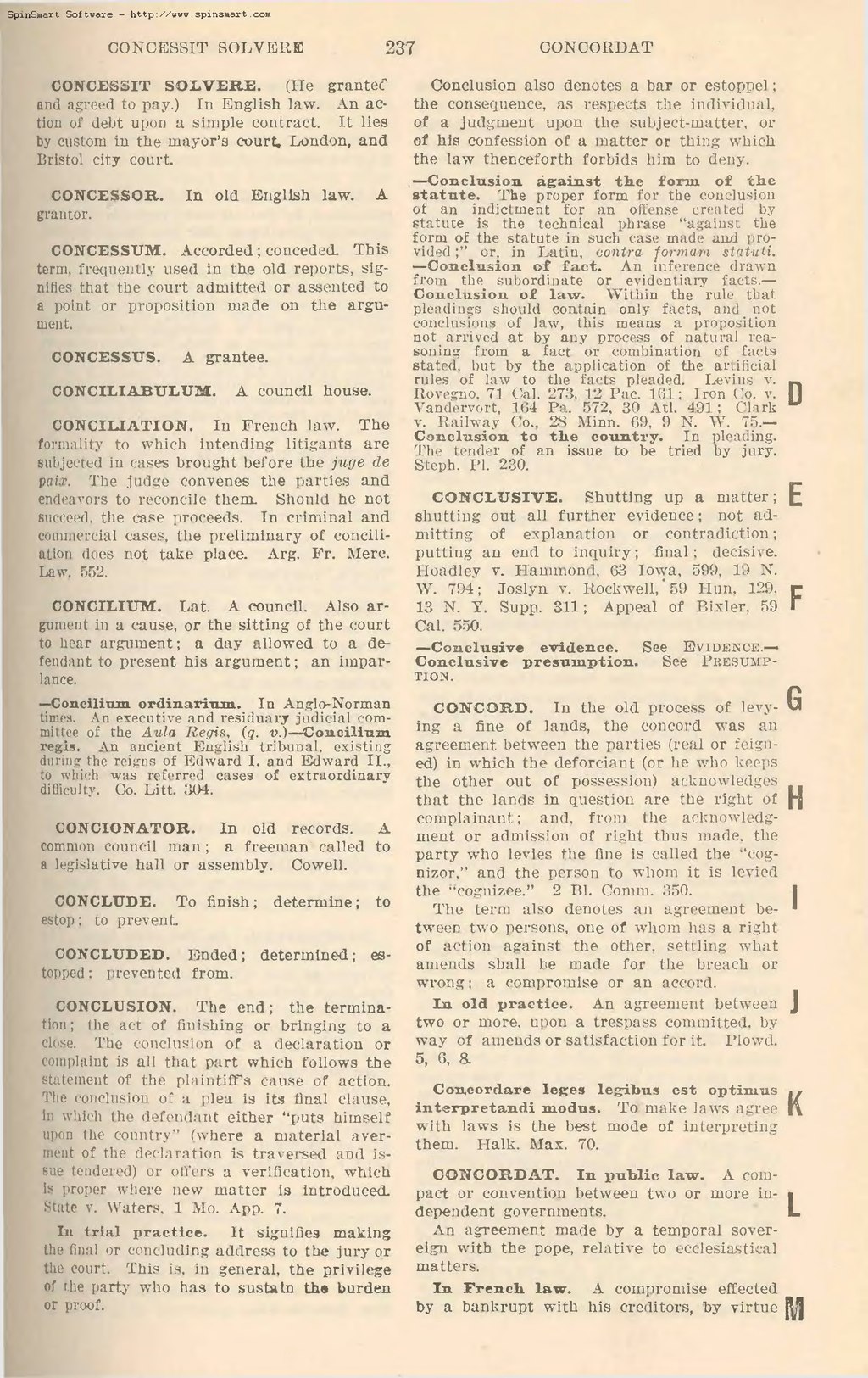CONCESSIT SOLVERE. (He grantee‘ and agreed to pay.) In English law. An action of debt upon a simpie contract It lies by custom in the mayor's court. London, and Bristol city court
CONCESSOR. grantor.
In old English law. A
CONGESSUM. Accorded;conceded. This term. i'requentl_v used in the old reports. signifies that the court admitted or assented to I point or proposition made on the argu- Iucnt
CONCILSSUS. A grantee.
CONCILIABULUM. A council house.
CONCILIATION. In French law. The tormiliiy to which intending litigants are Elilijetleli in cases brought before the jug»: rte pair. The judge convenes the parties and endeavors to reconciie them. Should he not smreefl, the case proceeds. In criminal and commercial cases, the preliminary of concili- atlou does not take place. Arg. Fr. iiierc. Law. 552.
CONCILIUM. Lat. A council. Also ar-
gument in a cause, or the sitting of the court to hear argument; a day allowed to a detcudnut to present his argument; an impariauce. —Concl1inm ordinarium. In An,-,rlo~Norman timts An executive and residuary judicial com- mittee of the Aula Reyin. (:1. ¢:.)—Conci1inm regis. An ancient English tribunal. existing during the reigns of Edward I, and Edward II,, to which was referred cases of extraordinary diificuif-)2 Co. Intt. 301.
CONCIONATOR. In old records. A common council man; u freeman called to a legislative hall or assembly. Cowell.
CONCLKTDE. To finish: eswp: to prevent.
determine; to
CONCLUDED. topped '
Ended: determined; $- prevented t'1om.
CONCLUSION. The end; the termination; the act of finishing or bringing to a (law, The conclusion of a declaration or mnpialnt is all that part which follows the stltrment of the pl-iintlifs cause of action. 'i!.c muclnslon of :1 plea is its final clause. in which the defendant either "puts himself l[\'Ii the country" (where a material avermeut of the declaration is traversed and is- m: ieudereci) or oii‘crs a verification, which i_.~ proper where new matter is introduced. mute r. Waters. 1 Mo. App. 7.
In trial practice. It signifies making the liual or including address to the jury or the court. This is, in general, the privilege or the party who has to sustain the burden or proof.
237
CONCORDAT
Conclusion also denotes a bar or estoppel; the consequence, as respects the individual, of a judgment upon the subject-matter. or of his confession of a matter or thing which the law thenceforth forbids him to deny.
—Cnnclusion against the form of the ltntute. The proper form for the conclusion of an indictment for an offense created by statute is the technical phrase "against the form of the statute in sucb case made and provided:" or. in tin. contra formwm stat-uti. —Conclusion of fact. An mt:-reuce dlarrn from the subordinate or evldentiary facts.-— Gonulusion of law. WitlIin the rule that pleadings should contain only facts, and not conclusions of law. this means a proposition not nrrivcd at by any process of natural reasoning from a fact or combination of acts stated but by the application of the artificial rules of law to the facts pleaded. Lerius v. D
Rove_'.':no. 71 Cal. 273, 12 Pnc. 161: Iron Co. v. Vundorvnrt. 164 Pa. 57% 30 Atl. 491: v. Railway Co.. 29 Minn. 69. 9 N. W. 75.- Conclusinn to the country. In pleading. The tender of an issue to be tried by jury. Stepl). Pl. 230.
GONCLUSIVE. Shutting up a matter; E shutting out all further evidence; not ad- mitting of explanation or contradiction: putting on end to inquiry; final; decisive. Hourlley v. Hammond. 63 Iowa. 599. 19 N. W. 794; Joslyn v. Rochwell.'59 Hun. 199. F 13 N. Y. Supp. 311; Appeal of Bixier, 59 Cal. 550.
—Conclulive evidence.
Conclusive presumption. -r1oN.
See EVIDENCE.- See Possum?-
GONGORD. In the old process of levy- G ing a fine of lands, the concord was an agreement between the parties (real or feigned) in which the deforciant (or he who means the other out of possession) acirnowledgges that the lands in question are the right of H complainant: anti. from the acknowledgment or admission of right thus made, the party who levies the line is called the "cognizor." and the person to whom it is levied the "cogi1izee." 2 Bl. Comm. 350. I
The term also denotes an agreement between two persons, one of whom has a right of action against the other. settling what amends shall be made for the breach or wrong: a compromise or an accord.
In old practice. An agreement between J two or more, upon a trespass committed. hy way of amends or satisfaction for it. Piowd.
5. 6, B.
Connor-dnre liege: leg-ibus est optimus interpretnndi modns. To make laws av,-.'rec K with laws is the best mode of interpreting them. I-iailr. Max. 70.
CONCORDAT. In public Law. A C0l.‘i.i- pact or convention between two or more independent governments. L
An agreement made by a temporal sovereign with the pope. relative to ecclesiastical matters.
In French law. A compromise effected by a bankrupt with his creditors, by virtue M
